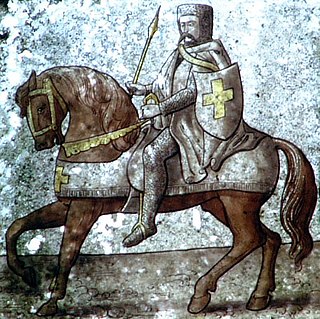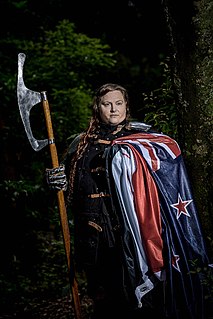
The FIFA World Cup, often simply called the World Cup, is an international association football competition contested by the senior men's national teams of the members of the Fédération Internationale de Football Association (FIFA), the sport's global governing body. The championship has been awarded every four years since the inaugural tournament in 1930, except in 1942 and 1946 when it was not held because of the Second World War. The current champion is France, which won its second title at the 2018 tournament in Russia.

A knight is a man granted an honorary title of knighthood by a monarch, bishop or other political or religious leader for service to the monarch or a Christian church, especially in a military capacity.

The Rugby World Cup is a men's rugby union tournament contested every four years between the top international teams. The tournament was first held in 1987, when the tournament was co-hosted by New Zealand and Australia.
Year 1236 (MCCXXXVI) was a leap year starting on Tuesday of the Julian calendar.

Historical reenactment is an educational or entertainment activity in which people follow a plan to recreate aspects of a historical event or period. This may be as narrow as a specific moment from a battle, such as the reenactment of Pickett's Charge presented during the Great Reunion of 1913, or as broad as an entire period, such as Regency reenactment or The 1920s Berlin Project.

Jousting is a martial game or hastilude between two horsemen wielding lances with blunted tips, often as part of a tournament. The primary aim was to replicate a clash of heavy cavalry, with each participant trying hard to strike the opponent while riding towards him at high speed, breaking the lance on the opponent's shield or jousting armour if possible, or unhorsing him. The joust became an iconic characteristic of the knight in Romantic medievalism. The participants experience close to three and a quarter times their body weight in G-forces when the lances collide with their armour.

The CONCACAF Gold Cup is the main association football competition of the men's national football teams governed by CONCACAF, determining the continental champion of North America, Central America, and the Caribbean. The Gold Cup is held every two years.

A tournament, or tourney, was a chivalrous competition or mock fight in Europe in the Middle Ages and Renaissance. It is one type of hastilude.

The Ghana national football team represents Ghana in international association football and has done so since the 1950s. The team is nicknamed the Black Stars after the Black Star of Africa in the flag of Ghana. It is administered by the Ghana Football Association, the governing body for football in Ghana and the oldest football association in Africa. Prior to 1957, the team played as the Gold Coast.

Medieval Times Dinner and Tournament is a family dinner theater featuring staged medieval-style games, sword-fighting, and jousting. Medieval Times Entertainment, the holding company, is headquartered in Irving, Texas.

Medieval reenactment is a form of historical reenactment that focuses on re-enacting European history in the period from the fall of Rome to about the end of the 15th century. The second half of this period is often called the Middle Ages. This multiplicity of terms is compounded by the variety of other terms used for the period.

Combat reenactment is a side of historical reenactment which aims to depict historical forms of combat. This may refer to either single combat, melees involving small groups, or nearly full-scale battles with hundreds of participants.

Medieval II: Total War is a turn-based strategy and real-time tactics video game, the sequel to 2002's Medieval: Total War and the fourth game in the Total War series by Creative Assembly. It was released on 10 November 2006 for Windows. On 14 January 2016, the game was released for macOS and Linux as Medieval II: Total War Collection which includes the Kingdoms expansion pack. The game is set between the years 1080 and 1530. Like the original Medieval: Total War, it focuses on medieval warfare, religion and politics in Europe, North Africa and the Middle East.
Botn may refer to the following locations:

Hospital de Órbigo is a municipality located in the province of León, Castile and León, Spain. According to the 2010 census (INE), the municipality has a population of 1,031 inhabitants.
Historical Medieval Battles (HMB) is a rather young modern sport, full contact fighting with the use of offensive and defensive weapons characteristic of the Middle Ages. Specifically the armour and weapons must be of the style from the dates 1200 to 1699, with location irrelevant. HMB is a full contact fighting on steel blunt weapons. Fighters are dressed in full armor, which, like the weapons, is made according to historical standards. One person's full set of armour must originate from the same place and within a fifty-year time span. Blows may be aimed at any parts of the body ; both wrestling and percussive techniques are permitted.

The Total Africa Women Cup of Nations is an international women's football competition held every two years and sanctioned by the Confederation of African Football (CAF). It was first contested in 1991, but was not held biennially until 1998. Nigeria is the most successful nation in the tournament's history, having won a record 11 titles, meaning they have won all but two of the previous tournaments. Ghana hosted the tournament in 2018.
The International Medieval Combat Federation, (IMCF) is a global historical full contact sport fighting revival movement, in which combatants use historically accurate reproduction medieval and early modern armour and blunted weapons to engage in competitive fights according to authentic historical tournament rules. Founded in 2013, the organisation now attracts hundred of fighters from 26 countries at various fighting competitions around the world. Most events are open to the public and major competitions are regularly seen by tens of thousands of spectators. The league holds dozens of smaller events throughout the year as well as a world championship competition in which national teams, selected from local or regional clubs in their respective countries, assemble at a suitably historical venue to compete. These events take the character of a medieval tournament, with historical attractions and exhibits beside the competition, as well as market stalls selling historically-themed foods, goods and souvenirs. Competing teams are billeted in reproduction medieval camps and must wear authentic clothing. Somewhat unlike the medieval competition, fighting is exclusively on foot, and strict rules are enforced to ensure the safety of competitors and fairness in the competition. The fighting can be between individuals or teams of up to 16 fighters per side.

Dayna Berghan-Whyman is a medieval fighter from New Zealand. She is New Zealand Māori, of Ngati Kahu iwi. She has represented New Zealand at the International Medieval Combat Federation World Championships twice, in 2017 and 2018.















